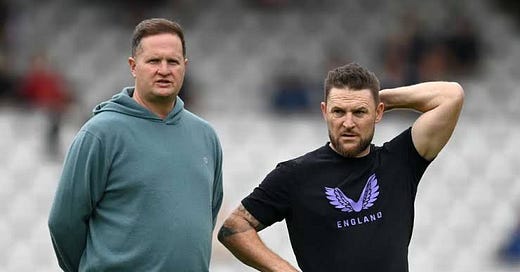One of the inevitable consequences of pared-down domestic tournaments is that selection criteria for international cricket are changing, and in most major countries. England are leading the way with a policy of identifying ‘what’ they want before they bother with the ‘who’ – or whether they’ve got a decent record, or any record.
England’s Director of Cricket, Rob Key, hides his disdain for county cricket, at least as the primary source of international cricketers, but not very well. When he captained Kent there were too many games and too many journeymen playing in them. The lack of dynamism on the field wore him down, as did the county members who had too much say in how the domestic game was administered.
These days Key is running the England national team his way by allowing Brendon McCullum and Ben Stokes to run it their way - and the way into it does not necessarily mean scoring lots of runs or taking heaps of wickets in domestic cricket. Eye-catching performers for the England Lions and even the Under-19 team, however, have a good chance of being fast-tracked.
England teams were selected using roughly the same formula for over a century so a change was overdue and, in well deserved fairness, pretty much every ‘bolter’ has come up trumps. Four bowlers have taken five-fors on debut in the last couple of years and there has not been a single flop, even amongst those with barely a handful of first-class games to their credit. Some have been soaring successes, most notably Gus Atkinson and Shoaib Bashir.
South Africa has little choice but to follow a similar path, but it is littered with dangers which don’t exist in England. Key, Stokes and McCullum can afford to ride the criticism that they have established a ‘Mates Club’ into which Membership is strictly controlled and limited. Physical attributes like ‘release point’ for spinners and speed for fast bowlers, strike rate for batsmen, these are understandable.
Reliable word has it, though, that personality and ‘character’ are just as important. And the management ‘group’ have done nothing to dispel the notion that golf and other pastimes are requisites to fitting in. James Anderson’s chit to skip the start of the Test series in Pakistan to play in the Dunhill Links pro-am infuriated many observers, but the truly extraordinary result in Multan silenced them, mostly.
Proteas Test coach, Shukri Conrad, was forced to select an eclectic squad of wannabes and hasbeens for the series in New Zealand in February setting a precedent which can never be undone. White ball coach, Rob Walter, has his hand forced in other ways, financial mostly. CSA have no choice other than to allow senior players to cash in on domestic leagues. At least Walter has ‘form’ to guide his alternative selections although he has to weigh the significance of American, Canadian, Sri Lankan and whatever other competitions.
For some players it all becomes a bit too much, however compelling their desires and dreams of playing international cricket once were. Some choose the Captain Oates option: “I’m going outside, I may be some time,” and disappear. Very few feel emboldened enough towards honesty, unless they have 10-year careers in national service. In South Africa, perceptions of sportsmen turning their backs on national availability are acidic.
In England, not so much. Liam Dawson, top three spinner in the Championship for the last couple of years and averaging 50 with the bat, has backed away from national selection. His whopping pay cheque in the SA20 helps. He is frank and diplomatic in equal measure, offering support to the national team but distancing himself from selection.
Simon Harmer, meanwhile, fought like a caged racoon for national recognition. The Essex spinner has been at the top of the Championship averages for years. Eventually, he was recalled with spectacular results. He claimed match figures of 7-124 and 6-73 in two Tests against Bangladesh at Kingsmead and St.George’s Park. He and Keshav Maharaj dismissed the Bangla Tigers by themselves, literally.
Harmer, the most prolific off-spinner in world cricket for the last six years, was unavailable for selection for the two-Test tour of Bangladesh in a couple of weeks. It should not be an issue. He is 35-years-old, established as a Chelmsford legend and focused on playing for as many years as he can, or at least as many as he keeps taking wickets.
But this column was inspired by the selection of Dewald Brevis as the replacement for the injured Temba Bavuma for the Tests in Bangladesh. Gut feel? The justification in a CSA press release was that he “scored 49 and 74 in the second four-day match” for SA ‘A’ against Sri Lanka ‘A’ last month.
Like Key’s England, South Africa is now looking beyond their first-class tournament with selectors using their ‘experience’ rather than statistics. It is an exciting time. Brevis clearly has a rare talent. Perhaps there is also the fear that he may be swallowed up and lost by the Mumbai Indians behemoth.
The danger is that many of South Africa’s professionals begin to realise that their numbers in a shortened competition are irrelevant. It becomes more about who you know, who knows you and what you know about making friends and influencing them. And that’s not healthy, or happy.






I wonder if, in England, having a distinctive coaching philosophy at the top level is contributing to that trend? It doesn't seem like the Championship is very Bazball-y so, as McCullum, you may well want to get younger players less tainted by other coaching philosophies into your set-up. Whereas few people would be able to say without Google who the Aussie coach was in the glory days of McGrath, Warne, et al - that wasn't driven by coaching philosophy, it was driven by talented cricketers making their way through the first-class matches :)
Is it not a selectors’ job to select on the basis of what might be achieved, not what has been?